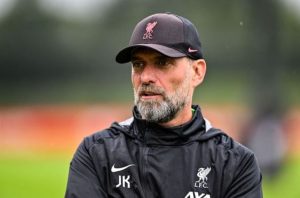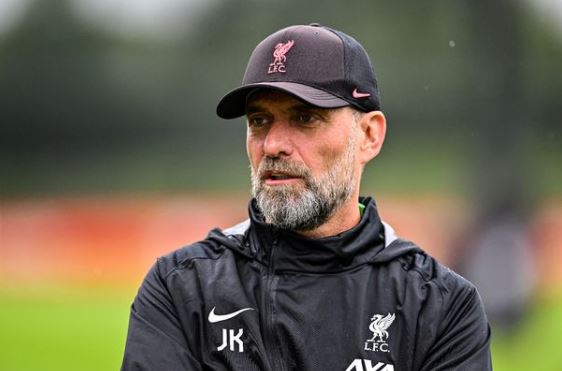Liverpool boss Jürgen Klopp is launching his own version of a strategy used by Pep Guardiola and Mikel Arteta, but he’s put a higher-risk, higher-reward spin on it.
If you can’t beat them, join them. That’s what Liverpool manager Jürgen Klopp may have thought to himself as he adopted a similar approach to the Premier League top two for the final 10 games of last season.
Liverpool had struggled all year but came alive late on after Klopp decided to push one of his full-backs — Trent Alexander-Arnold — into a box midfield in possession, just like Pep Guardiola and Mikel Arteta had been doing at Manchester City and Arsenal.
At City, Guardiola instructed John Stones to join Rodri in midfield when his team had the ball, and this was counterbalanced by the opposite full-back Nathan Aké.
Aké nominally featured on the left of a four but he was in truth a third center-back with only limited licence to get forward, as evidenced by his tally of just 12.3 touches in the attacking third per 90 minutes.
When Stones pushed up into midfield, the Dutchman would remain in a deep position ready to help mop up any counterattacks. In effect, it was a safety net.
Arteta, meanwhile, emulated his former boss Guardiola by inverting ex-City man Oleksandr Zinchenko on the left side of the midfield.
Ben White, the opposite full-back, was allowed to be more aggressive (as demonstrated by his 20.2 touches in the attacking third per 90), but he didn’t overlap his winger with the same frequency that a right-back would in a more conventional setup.
White picked up more advanced positions when Arsenal had the ball but still recognized that there were some restrictions on his freedom.
While Guardiola and Arteta have both looked to converted center-backs to make their systems work, though, Klopp used a natural full-back in Andy Robertson as his counterweight to Alexander-Arnold, and not only that — a full-back who often played more like a winger.
We did see a more conservative Robertson in those 10 matches, but the extent of the transformation has certainly been exaggerated. He averaged 26 touches in the attacking third per 90 minutes across that stretch, considerably more than White and Aké and, surprisingly, even more than he’d recorded for the first three-quarters of the season. Klopp had put a markedly more assertive spin on things.
Some would argue this was to do with the personnel he had available during the season, pointing out that Liverpool wants a left-sided center-back during the summer transfer window, theoretically to emulate Arsenal and City (via Fabrizio Romano/Here We Go Podcast).
We simply don’t know how Klopp’s new setup will evolve after a full off-season, but regardless of who comes in or what tweaks are made, it’s hard to imagine that Robertson won’t be starting the majority of matches given his historical importance.
Indeed, as we explained here, Liverpool has already hinted at favoring offensive-minded full-backs by foregoing the lucrative sale of Robertson’s understudy Kostas Tsimikas.
In essence, then, it looks as if Klopp is going to find another way to make the inverted full-back approach work, whether that means using different players or simply different means to provide a counterattacking fire blanket and ensure his team isn’t left overly exposed.
The signs were promising last season as Liverpool rattled off seven wins from 10 matches, but it’s worth noting that the teams it beat ended up in an average finishing position of 13th, with four of them occupying the bottom seven.

It will be much more difficult to maintain an elite points-per-game rate across a whole season, especially when opposing teams have had more time to decipher the new system.
Klopp may have been inspired by the success of Guardiola and Arteta, but his template appears to be the boldest of the lot.
However, if Liverpool can find a way to incorporate two playmaking full-backs without sacrificing balance, then the rewards could be even greater too.


